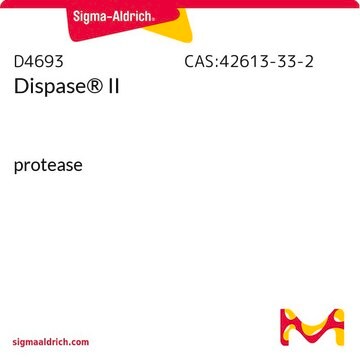C2-BIOC
Collagenase Type II, Cls II
Synonym(s):
Collagen A
Sign Into View Organizational & Contract Pricing
All Photos(1)
About This Item
UNSPSC Code:
12352204
NACRES:
NA.78
Recommended Products
Looking for similar products? Visit Product Comparison Guide
Related Categories
General description
Collagenase Type II (Cls II) is one of the main tissue dissociation enzymes produced by Clostridium histolyticum. It aids to digest the smaller collagen fragments produced by Type I collagenase. Collagenases, a member of the matrix metalloproteinase (MMPs) family, digests collagen in the extracellular matrix (ECM). Collagens are triple helix structural proteins comprising three collagen polypeptides with high tensile strength.
This product is identical to Biochrom GmbH part numbers C2-22 and C2-28. Enzyme blending from collagenase, clostripain, with tryptic and proteolytic activities from Clostridium histolyticum. This preparation shows a high clostripain activity with the tryptic activity close to type I. Suitable for liver, bone, thyroid, heart, and salivary gland tissue. Specific activity is 125 to 250 Mandl units per milligram of powdered substance.
Application
Collagenase Type II (Cls II) has been used:
- as a component of Roswell park memorial Institute (RPMI)-1640 media to digest hepatic tissues
- to perfuse murine heart for the isolation of epicardial stromal cells (EpiSC)
- to digest collagenase and inject it into the intrarenal aorta abdominalis to perfuse the kidneys
Choose from one of the most recent versions:
Certificates of Analysis (COA)
Lot/Batch Number
Don't see the Right Version?
If you require a particular version, you can look up a specific certificate by the Lot or Batch number.
Already Own This Product?
Find documentation for the products that you have recently purchased in the Document Library.
Tissue dissociation enzymes for adipose stromal vascular fraction cell isolation: a review
Lockhart RA, et al.
Journal of stem cell research & therapy (2015)
Yu-Yao Zhang et al.
Stem cell research & therapy, 13(1), 340-340 (2022-07-27)
Nucleus pulposus mesenchymal stem cells (NPMSCs) transplantation is a promising treatment for intervertebral disc degeneration (IVDD). However, the transplanted NPMSCs exhibited weak cell proliferation, high cell apoptosis, and a low ability to resist the harsh microenvironment of the degenerated intervertebral
Integrin αVβ3 Signaling in the Progression of Osteoarthritis Induced by Excessive Mechanical Stress.
Fanglong Song et al.
Inflammation, 46(2), 739-751 (2022-12-09)
Osteoarthritis (OA) is believed to be linked with cartilage degeneration, subchondral bone sclerosis, and synovial inflammation that lead to joint failure, and yet treatment that can effectively reverse the pathological process of the disease still not exists. Recent evidence suggests
Julia Hesse et al.
eLife, 10 (2021-06-22)
In the adult heart, the epicardium becomes activated after injury, contributing to cardiac healing by secretion of paracrine factors. Here, we analyzed by single-cell RNA sequencing combined with RNA in situ hybridization and lineage tracing of Wilms tumor protein 1-positive
Zijie Zhou et al.
Aging and disease (2023-05-17)
Intervertebral disc degeneration is a leading cause of disability in the elderly population. Rigid extracellular matrix is a critical pathological feature of disc degeneration, leading to aberrant nucleus pulposus cells (NPCs) proliferation. However, the underlying mechanism is unclear. Here, we
Our team of scientists has experience in all areas of research including Life Science, Material Science, Chemical Synthesis, Chromatography, Analytical and many others.
Contact Technical Service





